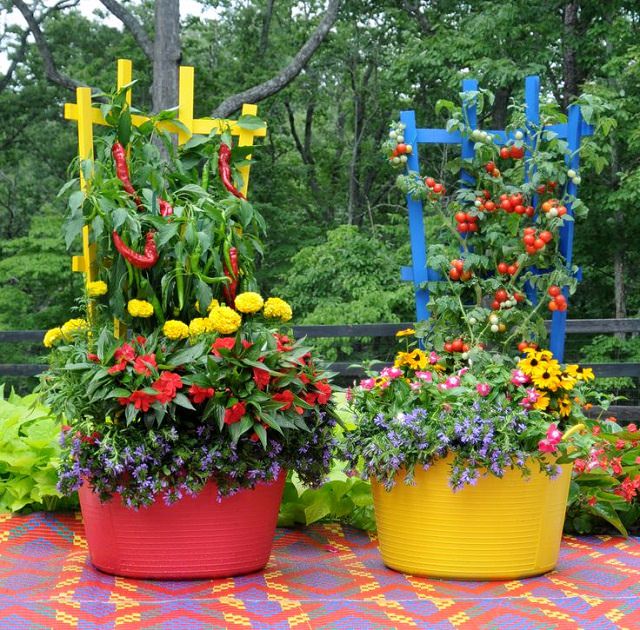10 Essential Container Gardening Tips for Balconies

10 Essential Container Gardening Tips for Balconies
Container gardening opens a world of possibilities for urban dwellers keen on cultivating their green thumb despite space constraints. Balconies, in particular, offer a perfect canvas for creating lush, thriving gardens. Here’s how you can transform your balcony into a verdant oasis with these essential tips.
Choose the Right Container
Selecting the appropriate container lays the foundation for successful balcony gardening. Opt for materials such as ceramic, plastic, or wood, ensuring they have adequate drainage holes to prevent waterlogging. Upcycling old containers like buckets or planters can also add a unique touch to your garden.
Select the Right Plants
When it comes to balcony gardening, choosing the right plants is key to maximizing space and climate suitability. Compact options like basil, thyme, and rosemary herbs thrive alongside vibrant petunias, impatiens, and marigolds. For fresh produce, consider lettuce, tomatoes, and peppers, all of which flourish in containers.
Use the Right Soil
The soil composition directly impacts plant health and growth. Opt for a well-draining potting mix rich in nutrients, or customize your blend with peat moss, vermiculite, and perlite for optimal air, water, and nutrient balance.
Water Wisely
Proper watering is crucial for container plants. To gauge moisture levels, insert your finger into the soil; water when the top inch feels dry. Use a gentle spray from a watering can or hose to avoid soil disruption and ensure even hydration.
Add Mulch
Mulching not only conserves moisture but also suppresses weeds and maintains soil temperature. Bark chips, straw, or even newspaper make excellent mulching materials, placed a few inches away from plant stems to prevent rot.
Use Fertilizer
Nourish your plants with a balanced fertilizer like 10-10-10, following package instructions for application. Organic alternatives such as compost tea or worm castings enrich the soil naturally, promoting robust plant growth.
Prune and Trim
Regular pruning and trimming keep plants healthy and aesthetically pleasing. Remove dead or diseased foliage to prevent spread and encourage new growth. Shaping plants also helps control their size and appearance.
Monitor for Pests and Diseases
Vigilance against pests and diseases is crucial in maintaining plant health. Watch for symptoms like yellowing leaves or unusual spots, addressing issues promptly with organic remedies like neem oil or insecticidal soap.
Rotate and Repot
To ensure balanced sunlight exposure and adequate root space, rotate plants periodically. As plants outgrow their containers, repot them into larger vessels to support continued growth and vitality.
Enjoy Your Garden
Above all, relish the joys of your balcony garden as a sanctuary of natural beauty and tranquility. Take time to savor the fruits of your labor and appreciate the serene ambiance it brings to your urban living space.
Additional Tips
For vining plants like tomatoes, utilize trellises or stakes to support upward growth. Introducing a small water feature can enhance the garden’s ambiance and provide a soothing element. Consider using self-watering containers to maintain optimal moisture levels effortlessly.
Urban Garden Design Inspiration
For further inspiration on maximizing your small-space garden, explore container gardening ideas for small spaces from Better Homes & Gardens.
Conclusion
Embarking on container gardening on your balcony enriches urban living with the charm of nature. By implementing these 10 essential tips, you can cultivate a flourishing garden that not only beautifies your space but also rejuvenates your spirit. Remember, with the right plants, soil, and care, your balcony can become a thriving oasis of greenery.
FAQs
Q: What are some ideal plants for balcony gardens?
- A: Compact herbs, vibrant flowers like petunias, and vegetables such as tomatoes are excellent choices for balcony gardening.
Q: How often should I water my balcony plants?
- A: Water when the soil feels dry to the touch, typically every few days depending on weather conditions.
Q: Can any container be used for balcony gardening?
- A: Containers made from ceramic, plastic, or wood with adequate drainage are suitable. Avoid containers that retain excess water.
Q: When should I consider repotting my plants?
- A: Repot plants when roots outgrow their current container or show signs of overcrowding.
Q: Are organic fertilizers suitable for balcony gardens?
- A: Yes, organic options like compost tea provide nutrients naturally, supporting healthy plant growth without environmental harm.
0 Response to " 10 Essential Container Gardening Tips for Balconies"
Post a Comment